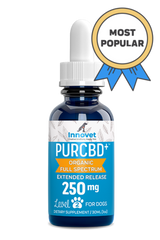
We’re increasingly seeing pet owners make the change from chemically-based remedies to all-natural products. As you take a look into the facts, it really isn’t a surprise that so many prefer non-toxic alternatives while treating their pet’s ailments. No harsh chemicals? No artificial ingredients? Best of all, almost adverse reactions? Sign me up! If you’re new to the wellness and holistic health world, welcome! It might shock you just how accessible most remedies are. As a matter of fact, the all-natural healer we’re going to talk about today might already be inside your pantry. Let’s get to the potential of apple cider vinegar and how it’s able to make a big difference for both you and the life of your dog.
- Apple Cider Vinegar: What is it?
- Is Apple Cider Vinegar A New Trend?
- Advantages of Apple Cider Vinegar for Canines
- How Much ACV Can I Give My Pet?
- What to Look for in the Best Apple Cider Vinegar
- How Long Will Apple Cider Vinegar Take to Work
- ACV: Does my Dog Need it?
- All-Natural Remedy Benefits
- CBD and ACV
- Apple Cider Vinegar for Pet Owners
- A Final Thought on ACV for Dogs
Apple Cider Vinegar: What is it?
Apple cider vinegar, also called ACV, is a kind of vinegar which has been getting a significant bit of attention within the past several years for the ways it’s able to improve human health. Recently, many began to wonder if any of these benefits also could be found for our pets. The answer is absolutely! Research shows that apple cider vinegar has impressive healing properties for cats and dogs alike. Pet owners
Is Apple Cider Vinegar A New Trend?
ACV is similar to white vinegar. The main difference is apple cider vinegar is made through the process of the fermentation of apples. The result of the process of fermentation is a substance that’s full of calcium, phosphorus, magnesium, potassium, iron, and other essential minerals and vitamins.
With all the health benefits, it isn’t a surprise that the medical use of apple cider vinegar isn’t a new idea. Although health blogs and the internet only have picked up on the idea in the past several years, apple cider vinegar has deep roots as it’ll come to
Advantages of Apple Cider Vinegar for Canines
You are likely wondering just how apple cider vinegar for dogs might have such benefits. You will find that most of the advantages are comparable to the ones found in human beings.
Apple Cider Vinegar is a Natural Flea Killer

Apple cider vinegar for dogs is a natural tick and flea repellent. During one point or another, you likely will need to deal with your pup getting fleas. Fleas are everywhere, even within climates you would not expect. Many pet owners do not like the concept of a monthly chemically-based prevention medication, yet obviously still want your dog to be free of fleas and ticks. Enter apple cider vinegar spray for dogs.
Spraying your pup with a 50/50 water and ACV solution before going outdoors is an efficient method of preventing ticks and fleas from making landfall on the fur of your dog.
Within many regions of the country, you might require additional protection during tick and flea season. ACV for dogs keeps the pH levels within the dog's blood somewhat acidic which fleas hate. Thereby, dog parents have discovered that adding two tablespoons of apple cider vinegar to their dog's water or food does the trick!
Alleviating Itchy Skin using Apple Cider Vinegar
If you have an animal who cannot seem to find any relief from itchy skin, apple cider vinegar might have the ability to help. Dog itching remedies apple cider vinegar will help relieve and soothe rashes that are caused by yeast. And, ACV is able to prevent the spread of yeast, as well as prevent the development of yeast infections.
Also, dogs who are susceptible to skin conditions like sarcoptic mange or demodectic mange have discovered excellent results with apple cider vinegar for pets treatment. ACV contains naturally-occurring acids that help destroy dead skin cells to expose healthy, new ones. Also, many holistic veterinarians recommend that treating developing hot spots using apple cider vinegar will assist in drying them out and eliminating the necessity to shave your dog.

Pet owners have discovered that combining a 50/50 solution of water and apple cider vinegar inside a spray bottle then applying the mix to their pup's coat does wonders for dry, itchy skin. But it’s vital that you do not apply the apple cider vinegar concoction to hot spots or open wounds as the acidity stings the raw skin. If applying the apple cider vinegar to the pup's coat is not possible, pet owners also have the choice to feed ACV through their pet’s water or food.
Apple Cider Vinegar is A Natural Ear Cleaner
Itchy skin usually is accompanied by itchy ears or ear mites! Due to its powerful antibacterial properties, dogs apple cider vinegar is a great way to keep your pup's ears clean and free if harmful bacteria and yeast. Holistic veterinarians recommend using half purified water and half ACV to prevent the development of ear infections.
Firstly, regularly check your pet's ears for gunk and wax. Clean anything out that should not be there by utilizing individual cotton balls that are soaked inside the solution. Continue with the process until no more wax or gunk comes out on your cotton ball.
Tear Staining and Coat Treatments
Even if your pet does not suffer with skin irritation, apple cider vinegar still can be a fantastic tool for returning life to dull coats. Apple cider vinegar also may be used to wipe off brown saliva stained fur and tear stains.
Also, many pet owners have found positive results in decreasing dog dander with ACV. Just massage the coat using full-strength ACV before you shampoo.
ACV For Digestion
If your pet experiences routine digestion problems like constipation or diarrhea, adding apple cider vinegar to their drinking water one time per day will help. The healthy enzymes inside ACV also have shown to aid in reducing bloating and gas.
Fighting Infection
ACV has natural antiseptic and antibiotic properties which prevent harmful viruses and bacteria from getting into the body. Even if your pet does not have a pre-existing condition, the use of apple cider vinegar in some dosages will assist in preventing the development of infections.
Apple Cider Vinegar for Bruises and Muscle Sprains
Topically used, pet owners may help ease their dog's bruises, sore muscles, and additional injuries. In using a cotton ball, put on a 50/50 mixture of water and ACV to the dog's body. As needed, reapply.
Easing Joint Discomfort and Arthritis
Internally used, ACV will assist in reducing joint inflammation from arthritis. Adding ACV to your senior pet's food two times per week will assist in breaking down calcium deposits discovered around the joints and thereby helps ease discomfort, pain, and stiffness.
Promotion of Dental Health
In adding one teaspoon of ACV to your dog's drinking water or food, it’s possible to assist in maintaining their dental health.
Studies continuously suggest the advantage of ACV as it comes to the prevention of tooth decay. It’s believed that ACV’s acidity levels help in breaking down plaque and removing tartar on your furry companion's teeth and doggy dental health.
Preventing and Healing UTIs
As aforementioned, dog UTI treatment apple cider vinegar has antibacterial and antiseptic properties which make it efficient at curing and preventing infections. It’s especially beneficial for canine UTI. Urinary tract infections oftentimes occur because of bacteria that invades the urinary tract from a system that has too much alkaline. ACV’s acidity helps neutralize the pH levels of the dog and is helpful in both alleviating existing infections and preventing new infections from developing.
There are many ways to implement apple cider vinegar into both you and the life of your dog.
DIY Apple Cider Vinegar Insect Repellent
Maybe the most common method that pet owners utilize dog apple cider vinegar is as an insect repellent. It’s suggested to mix one-part ACV and one part filtered water inside a spray bottle. Dog parents may spray the mix right onto the pup's coat before they go outdoors. Again, fleas dislike ACVs acidity and will hop right off of your pet's coat.
Removing Pet Odors and Stains
Also, apple cider vinegar is help at removing pet smells from your house and the dog itself.
Pet parents may blend one-part distilled apple cider vinegar dogs with three parts water then clean their carpeting or bloat furniture with the mix. It’s also an excellent tool for cleaning your dog's bedding. Most pet owners have discovered positive results in adding the blend to the laundry while washing their pet's bedding.
You also can add the concoction directly onto the dog's coat and allow them to air dry and naturally deodorize.
Lastly, adding apple cider vinegar to your dog shampoo is a great way to eliminate odor, prevent fleas, and keep their coat shiny all at the same time.
ACV For Cleaning Raw Food
We encourage our readership to consider feeding their pets a species-appropriate raw diet.
But, we’re also aware that the concept of feeding a raw food home-prepared diet comes with its share of cleanliness and health concerns. Specialists suggest using
How Much ACV Can I Give My Pet?
For dogs, professionals recommend these guidelines for mixing apple cider vinegar in their drinking water or food:What to Look for in the Best Apple Cider Vinegar

You will want to buy apple cider vinegar in its unpasteurized, organic, and raw form. It’s a vital detail to note. If you visit the grocery store in your area you might find apple cider vinegar that’s clear and appears like apple juice. You are probably looking at apple cider vinegar that has been manufactured commercially. Commercially produced ACV isn’t a real, traditional apple cider vinegar. It’s highly refined and processed. The apple cider vinegar you will want to buy will not look as aesthetically attractive as the clear ACV. It ought to be cloudy and probably will have a stringy substance floating around inside. Buying organic ACV in its unpasteurized, raw form also will assist in
How Long Will Apple Cider Vinegar Take to Work
It’s a common question and one that has different answers. The quantity of time for apple cider vinegar to take to work depends on the ailment you’re treating.
As far as digestive issues are concerned, pet parents ought to expect to begin to see results after a few days using apple cider vinegar. For skin conditions and infections, results might take a little longer to appear. But the ACV is working. Just be patient! Do
ACV: Does my Dog Need it?
ACV’s health benefits are undeniable. From preventing flea infestations to treating ear infections, ACV is a useful tool for pet owners who have the goal of steering clear of chemically based products which might cause your dog more harm than good. But that isn’t to say that every dog requires apple cider vinegar on routine basis. It’s vital to
All-Natural Remedy Benefits
One of the best things about changing to all-natural remedies is that, as appropriately used, you do not need to be concerned with them negatively interfering with additional holistic treatments. Only a few years ago, many pet owners did not feel that they had an option in how they treated their pet's ailments. One simple visit to the vet would typically result in leaving with a prescription which involved a laundry list of possible adverse reactions. With a host of information literally at our fingertips through the internet, dog parents have the ability to share knowledge and discover alternative methods of treatment that are equally effective and safer. From coconut oil to
CBD and ACV

An ideal example of this is CBD. You likely have heard by now of the herb and its amazing medical properties. As with apple cider vinegar, most people did not know about the possible advantages of the herb until they have the ability to begin to read about other pet owners having this type of success.CBD, comparable to ACV, has a string of benefits that range from improving digestive health and skin conditions to managing joint pain related to arthritis. And the best
Apple Cider Vinegar for Pet Owners
It’d be ridiculous of us to glaze over the advantages that ACV has shown to have for pet owners. Of course, to ensure that your dog is healthy, you must initially ensure that your own health is okay.
People around the world have found apple cider vinegar to have the following benefits:
- Relieving bruised muscles
- Controlling blood sugar
- All-natural teeth whitening
- Eliminating bad breath
- Decreasing nighttime leg cramps
- Boosting energy levels
- Boosting your immune system
- Clearing acne
- Eliminating dandruff
- Helping with weight loss and decreasing stomach fat
- Clearing stuffy nose
- Soothing sore throat
- Promoting heart health and lowering cholesterol
- May prevent gastrointestinal and indigestion problems
It’s possible to easily incorporate ACV into your diet by utilizing it in your cooking, that is, salad dressings.
Other folks love to dilute it in hot water, add some honey, and consume it as a beverage.
Whatever way you chose, the health advantages of ACV aren’t only extensive but impressive.
A Final Thought on ACV for Dogs
It’s important to be informed. The ideal way pet owners can make informed decisions for their pet's well-being is by understanding all there is to know about what they’re dealing with. If your pup is experiencing gastrointestinal problems, what’s the underlying cause? If it is something such as anxiety or a food allergy, apple cider vinegar will assist in relieving the symptoms yet won’t cure the core of the problem. The same will go for dogs that suffer with skin irritations. Yes, ACV will make a substantial difference and work to eliminate yeast and balance bacteria. But where’s the excess fungus and bacteria coming from? Maybe a change in diet also may be needed.
We know your pup's wellness and health means the world to you. Whether you’re curing an existing ailment or aiding in preventing one from developing, implementing raw, unpasteurized ACV truly can make a difference in the life of your dog.
For more information contact Innovet Pet Products today!
Sources:
Apple Cider Vinegar
Vinegar: Medicinal Uses and Antiglycemic Effect
Approved by:
Dr. Sara Ochoa
Doctor of Veterinary Medicine, St. Georges University

Thanks for stopping by!
P.S. We Love You!
Sincerely,
The Innovet Team
Please do not ask for emergency or specific medical questions about your pets in the comments. Innovet Pet Products is unable to provide you with specific medical advice or counseling. A detailed physical exam, patient history, and an established veterinarian are required to provide specific medical advice. If you are worried that your pet requires emergency attention or if you have specific medical questions related to your pet’s current or chronic health conditions, please contact or visit your local/preferred veterinarian, an animal-specific poison control hotline, or your local emergency veterinary care center.
Please share your experiences and stories, your opinions and feedback about this blog, or what you've learned that you'd like to share with others.

















